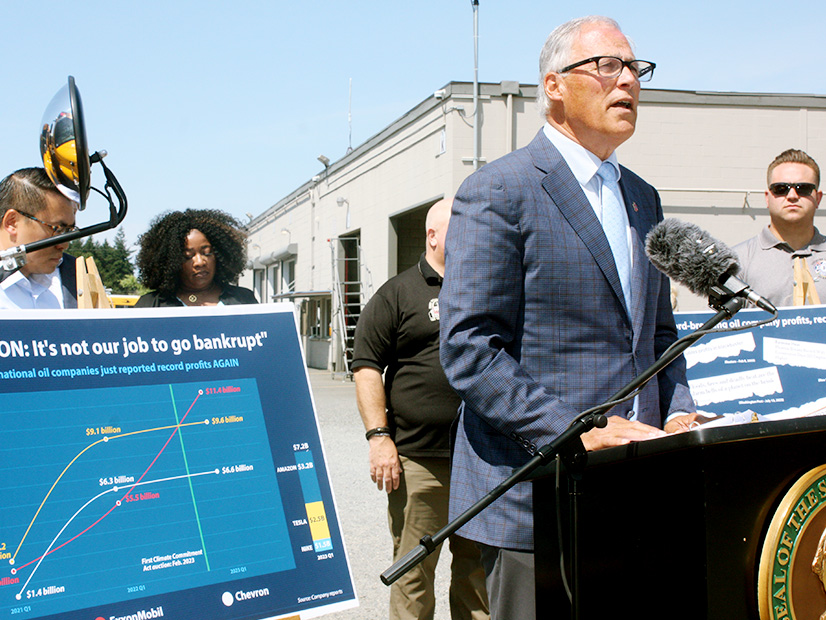
Washington’s Democratic leaders struck back at critics who blame the state’s 6-month-old cap-and-trade program for producing the highest gasoline prices in the U.S.
BURIEN, Wash. — Washington’s Democratic leaders last week struck back at critics who blame the state’s 6-month-old cap-and-trade program for producing the highest gasoline prices in the U.S.
That criticism came after Washington this month posted average pump prices of $4.959/gallon, far exceeding the national average of $3.54 and surpassing other expensive markets in the West. Soaring prices have prompted cap-and-trade opponents to criticize the program’s architects for not anticipating that oil companies would pass on to their customers the costs of buying carbon allowances. (See Cap-and-trade Driving up Washington Gasoline Prices, Critics Say.)
But on Thursday, Gov. Jay Inslee and Democratic legislative leaders counterattacked during a press conference in the Seattle suburb of Burien, accusing oil companies of taking advantage of cap-and-trade to gouge consumers.
“They are not just passing [the costs] on, they are padding their profits,” Inslee said at a Highline Public Schools transportation depot with four electric school buses in the background.
At the conference, Inslee’s office unveiled figures showing that Shell’s profits increased from $3.2 billion in the first quarter of 2021 to $9.6 billion during the same period this year. Over the same period, Exxon Mobil’s profits grew from $2.7 billion to $11.4 billion and Chevron’s profits jumped from $1.4 billion to $6.6 billion.
That equals a roughly $20 billion increase in profits over two years for the three companies.
“I can tell you that the gas and oil industry is not going bankrupt,” Inslee said.
During the conference, Democratic state lawmakers revealed they plan to introduce a bill next January to force oil companies to open up their finances to show if they are gouging gasoline customers while misdirecting the blame on the cap-and-trade system. Sen. Joe Nguyen (D) said he believes oil companies are raising prices long before they actually have to pay cap-and-trade auction prices.
Another bill could address any gouging discovered by the state, Nyugen and House Majority Leader Joe Fitzgibbon (D) said.
Inslee speculated that California’s efforts to force transparency on the oil industry in light of that state’s cap-and-trade program has led the industry to put increased economic pressure on Washington, whose second-in-the-nation cap-and-trade program went into effect early this year.
In the state’s first two carbon allowance auctions, prices reached $48.50/metric ton in February and $56.01 in May. Between the two auctions, Washington sold more than 17 million allowances. The auctions have raised almost $300 million for fiscal 2024, which began July 1, and $557 million for fiscal 2025, which still has three more quarterly auctions to come.
The revenues have far exceeded government projections.
Critics Strike Back
The oil industry and Republican legislators slammed Inslee after his conference Thursday.
Sen. John Braun, leader of the Senate Republican Caucus, said the conference was “a blatant attempt to scapegoat one of his favorite boogeymen, which is the oil industry.”
“It is patently ridiculous to assume the oil companies would just absorb the hit from the governor’s ‘Cap and Gouge’ plan,” Braun said in a statement. “The simple truth is that companies pass increases in their overhead on to their customers through higher prices — just as small business and gig workers pass along increased costs from taxes and regulations to their customers in the form of higher prices.”
“The governor’s and my Democratic colleagues were simply less than transparent in 2021 about the obvious consequences of their carbon-pricing scheme,” said Sen. Lynda Wilson, the Republican caucus’s budget leader. “They knew full well how this would raise the cost of gas, which is part of the agenda to push people away from internal-combustion engines and into either electric vehicles or public transit.”
In a separate written statement, Catherine Reheis-Boyd, president of the Western States Petroleum Association, said: “Rather than ‘strategically misrepresenting’ the issue to the public, the governor and lawmakers can help consumers and business in the state by working with us to fix the cap-and-trade program. They claimed the program would cost ‘pennies,’ but Washington’s consumers are now paying 50 cents per gallon for just the cap-and-trade program. In total, the state has collected more than $850 million from just two auctions, and there are three more ahead this year. It’s time for the political rhetoric to end and the real work to rein in the skyrocketing costs of this regulation to begin.”


